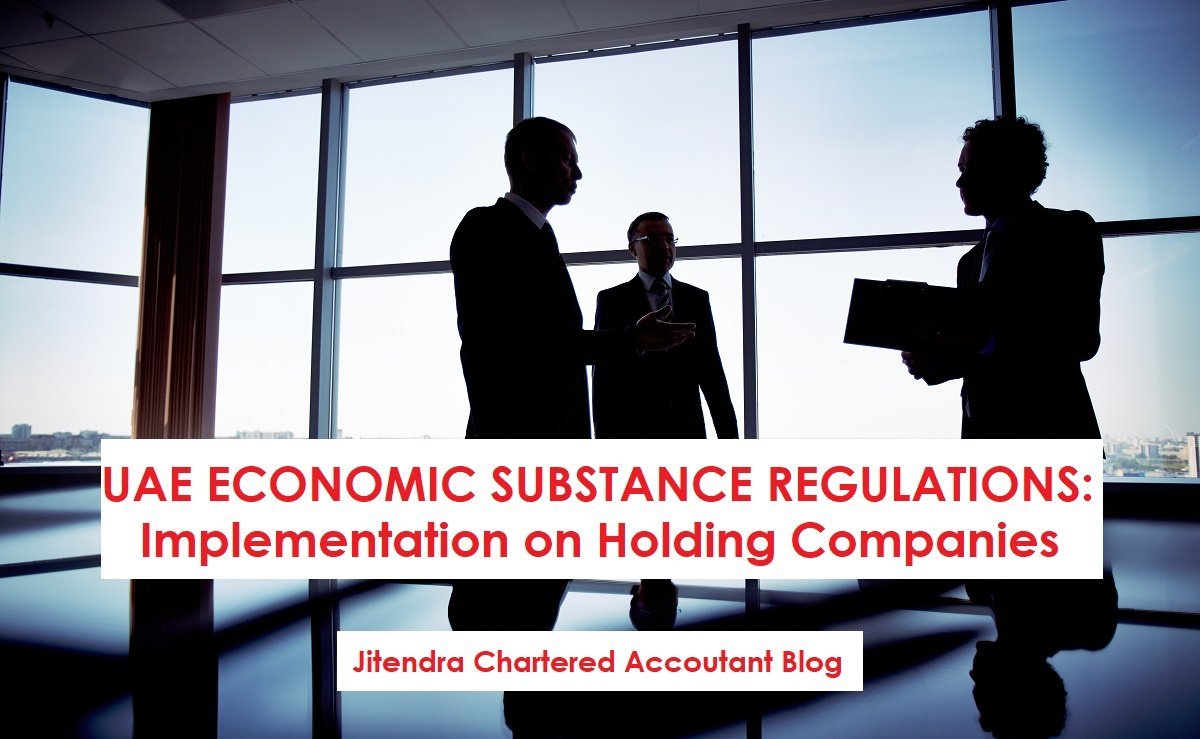As part of the UAE’s efforts to curb harmful tax practices and Base Erosion of Profit Shifting (BEPS), the companies that carry out the relevant activities in the UAE are required to demonstrate sufficient economic presence in the UAE. The UAE enacted the Economic Substance Regulations (ESR) in this regard to honour its commitment to the OECD’s Inclusive Framework as a member and also in response to the EU’s review of the country’s tax framework.
The companies are therefore required to notify the regulatory authority whether not they are carrying out the relevant activity; demonstrate economic substance in UAE and file economic substance return in relation to the activities such as banking, insurance, investment fund management business, lease-finance business, headquarters business, shipping business, holding company business, intellectual property (IP) business, and distribution & service business. The UAE ESR guideline has clearly delineated what a holding company business constitutes and the companies are required to conduct the self-assessment based on it.
What is ‘Holding Company Business Activity’ under Economic Substance Regulations?
If a company is carrying out the relevant activities in the UAE, then the entity comes under the scope of UAE ESR and such an eligible company is called a “licensee” under the UAE ESR law. The licensee can be a mainland company in Dubai or UAE or free zone companies under the regulatory authorities of JAFZA, DAFZA, DIFC, and RAKEZ, etc. If a licensee is carrying out the holding company business in Dubai, UAE if,
- It satisfies the definition of a holding company as per the applicable law in the jurisdiction
- Its primary function is holding shares or equitable interest in other companies
- Doesn’t conduct any other commercial activity in the UAE
What are the Core Income Generating Activities of Holding Businesses?
Under the ESR in UAE, a licensee is required to demonstrate economic substance and file economic substance return corresponding to the specific financial periods in which the entity generated any gross income from the relevant activity. Undertaking Core Income Generating Activities (CIGAs) in relation to the relevant activity is one of the core parameters for demonstrating the economic substance in the UAE. If the CIGA pertaining to the relevant activity involves making significant decisions, then the majority of individuals who make the decisions must be present in the UAE when the decisions were made.
The CIGAs under the holding business activity includes activities related to acquiring and holding shares or equitable interests in other companies. The Licensees should also note that such activities should not be part of another relevant activity. The following scenarios will explain the CIGAs of holding company activity,
Scenario 1
To illustrate the CIGAs, let us imagine a company ABC LLC whose only activity is holding shares in four other subsidiary companies. However, ABC LLC is also held by the regional holding company of the corporate group whose headquarters is in the US. ABC LLC’s only gross income is annual dividends earned from its subsidiaries. In this case, ABC LLC is considered as carrying out holding company business and come under the scope of ESR in UAE even though another company in the US is holding the LLC’s own shares.
Scenario 2
A company named XYZ LLC is into the manufacturing of food products but also holds shares in a company called PQR LLC which is carrying out restaurant business. XYZ LLC also earns dividend income from PQR LLC yet it is not considered as carrying out the holding company business because the business activity is food production. The company is not considered as carrying out a holding company business as foodstuff manufacturing and restaurant business don’t come under any of the relevant activities in the UAE ESR.
Why Choose Jitendra Chartered Accountants?
The ESR is expected to make a big impact on the way the companies operate in the UAE as the scope for tax evasion will be eliminated and the economy is poised to become much more transparent. The ESR will also enable the UAE to improve its image before global financial organizations like OECD and the EU and more foreign investors will express interest in company formation in Dubai, UAE. However, the companies need to make a proper self-assessment with regard to the relevant activities to demonstrate sufficient economic substance and also to file an annual ESR return in UAE.
Many companies have been in the dark over the definition of the activities and also found it a tough task to determine whether they come under the scope of ESR in UAE. It is in such situations that the professional assistance of reputed audit firms in Dubai, UAE such as Jitendra Chartered Accountants (JCA) comes in handy for the companies. JCA has a team of highly qualified Chartered Accountants and Business Setup Consultants who are well-versed in the UAE ESR law and top-notch professional assistance is guaranteed. JCA assists the companies in
- Assessment of relevant activities and annual ESR notification filing
- Preparing and submitting annual UAE ESR Return
- Suggesting recommendations if the companies fail to meet UAE economic substance test


